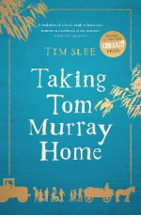Taking Tom Murray home by Tim Slee

Harper Collins, 2019. ISBN: 9781460757864. RRP $32.99
(Age: 14+) Highly recommended. The inaugural Banjo Prize
competition attracted 320 entries but it was Taking Tom Murray
home that took out the first prize with its truly authentic
Australian voice. Tim Slee's novel bristles with laconic wit, quirky
characters and bitter-sweet emotions and underlines with eloquence
the dilemmas faced by so many of our rural Aussies who are doing it
tough.
When the bank forecloses on Tom Murray's dairy farm he is determined
to go down in a blaze - literally. He sells off his stock, empties
the house of his family's possessions and burns it down.
Unfortunately Tom is trapped in the fire probably due to his weak
heart problem and loses his life. His widow Dawn refuses to allow
his death be in vain and decides to take his body to Melbourne for
burial thinking the several hundred kilometre 'funeral procession'
from their small rural town will offer people pause for thought on
the plight of so many struggling country folk. She is persuaded to
take the coffin on the back of a neighbour's vintage horse-drawn
milk cart for even more impact and so begins a poignant, fraught and
dramatic passive protest.
Told from the viewpoint of Jack, son of Tom and Dawn and twin of
Jenny, the journey begins with a local drama when the town bank
burns down. Immediately, the whole protest/procession takes on a new
and controversial aspect. As the travellers move slowly towards
Melbourne they are joined by supporters of all types, thwart the
frustrated police who try to find ways to stop them and alerted to a
wave of fires that are erupting around the country targeting banks
and supermarkets - who are seen as the corporate buddies threatening
the livelihoods and lives of the farmers. Rallied by stirring words
and the community spirit the grief and loss and frustration are
eased and bolstered by hope and possibilities.
The twist in the end is both a surprise and a damning indictment of
the pressures put upon the families who are fighting for their
survival and will give many readers cause to reflect on actions that
could make a difference to those who are the 'backbone' of our
country.
While essentially a novel that would be equally enjoyed and
appreciated by readers both young and old, there is a liberal
sprinkling of swearing which might preclude younger readers if you
were to put this in your school library.
Highly recommended for readers from around 14 years upwards.
Sue Warren